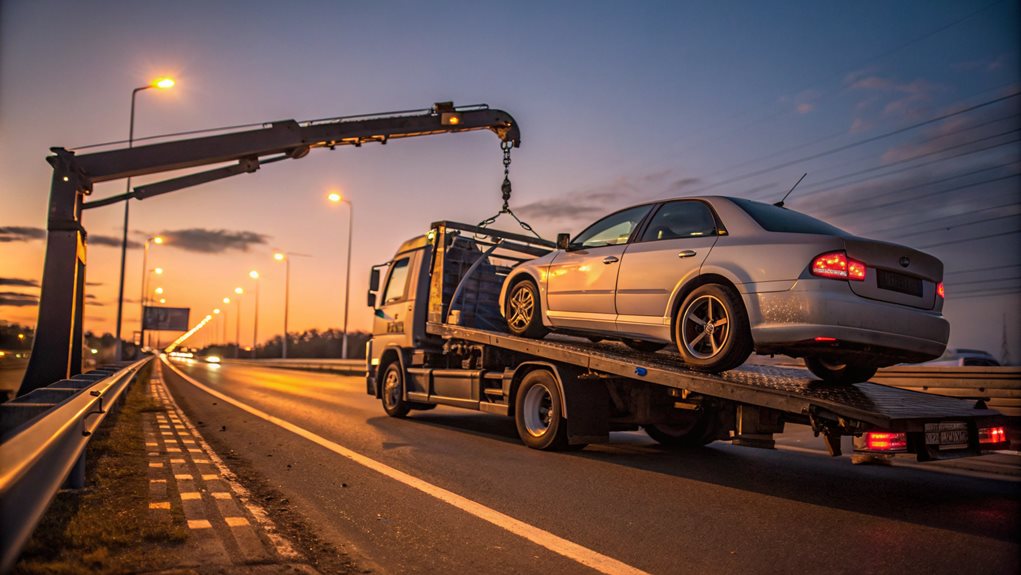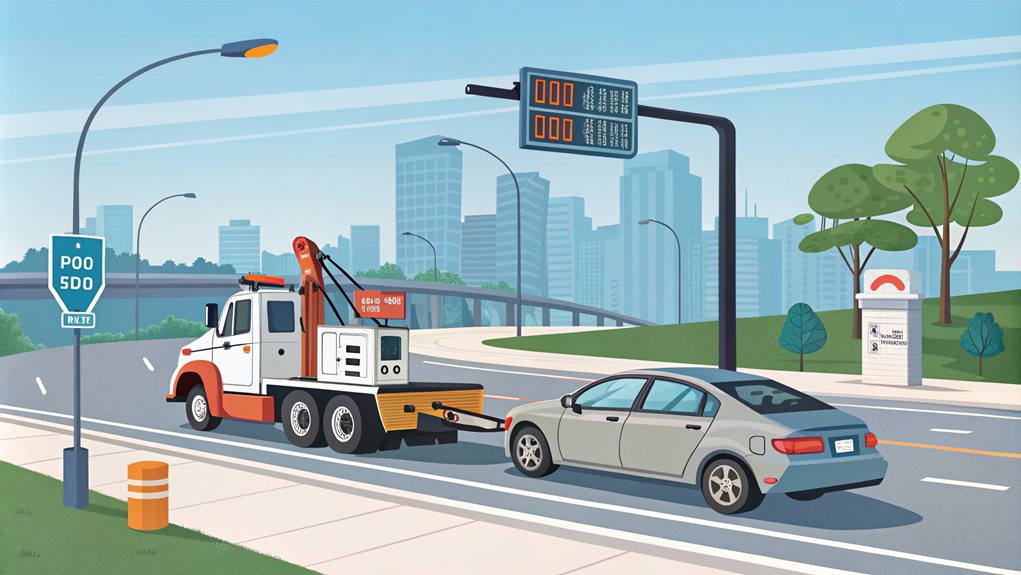Towing service costs depend on several factors with a base fee ranging from $35 to $100 and per-mile charges averaging $4.75, though these vary between $2.50 to $7. The type of tow truck required, such as flatbed or wheel-lift, affects costs, particularly for larger or luxury vehicles. Additional fees may arise for operating outside regular hours, during adverse weather, or in remote locations. The scenario drastically alters expenses as operational complexities increase with variables like distance, vehicle type, and conditions. Understanding these elements provides a clearer expectation of what to anticipate when engaging towing services. Continue to discover more nuanced details.
Expert Highlights
- Base fees for towing services range from $35 to $100, with per-mile charges typically between $2.50 and $7.
- Emergency factors like 24/7 availability and adverse weather can increase towing costs significantly.
- Larger or luxury vehicles require specialized equipment, leading to higher costs, up to 25% more for heavy-duty towing.
- Rates may vary during non-business hours or in urban centers due to higher operational costs.
- Difficult conditions, such as poor weather or holidays, can result in additional surcharges.
Understanding Towing Costs

When it comes to understanding towing costs, it is essential to recognize the various components that contribute to the overall expense. Primarily, towing services incorporate a base fee, which typically ranges from $35 to $100, covering the initial process of attaching a vehicle to the tow truck. Some companies include the first few miles within this base fee, while others proceed with per-mile charges, averaging around $4.75. Considering that the average towing cost per mile can range between $2.50 and $7, distance becomes a significant factor in determining final expenses. 24/7 emergency car jump start service is often part of comprehensive towing solutions and may affect overall pricing. Depending on the type of tow truck used, costs may vary as different trucks, such as flatbeds or wheel-lifts, have different operational costs. Additional fees might arise for services rendered at night, weekends, or holidays, and for vehicles stuck in precarious locations, necessitating winching. In addition, towing heavier or oversized vehicles can command premium rates, up to 25% more than standard charges, and specialized services like flatbed towing, also add to the detailed cost structure.
Influencing Price Factors
When determining the costs associated with towing services, several key factors come into play, especially the distance and time involved, the type and size of the vehicle, and the prevailing weather and road conditions. The distance and mileage directly dictate the fuel and labor expenses, escalating the overall price as distances grow longer or if the towing occurs during peak or unsociable hours. Additionally, larger vehicles demand specialized equipment and handling, while adverse weather and difficult terrains necessitate further operational adjustments, all of which contribute to a nuanced and variable pricing structure. It's worth noting that severe weather conditions significantly impact towing service costs, often leading to emergency response fees as companies deploy additional resources and staff. Roadside assistance can also help vehicle owners during lockouts, providing 24/7 services without causing further damage. Surcharges are often added for towing completed during non-business hours, further increasing costs.
Distance and Time Impact
Understanding the impact of distance and time on towing service costs is pivotal for consumers seeking affordable and timely assistance. When evaluating distance, note that towing companies typically impose a base fee, which often encompasses the first 5 to 10 miles of service. Beyond this, additional miles are charged at rates between $2.50 and $7.00 per mile, depending on location—urban centers often see higher pricing due to increased complexity and demand. Notably, the truck type can also influence per-mile pricing, as larger vehicles may require more resources for safe towing. For long-distance needs, costs accumulate substantially as both fuel and time considerations compound. Conversely, time of day introduces variability, with peak hours, late nights, or holidays commanding higher rates due to increased operator costs. Additionally, seasonal and weather-related factors may escalate charges further during extreme conditions.
Vehicle Type Considerations
Traversing the intricacies of towing service costs necessitates a keen understanding of vehicle type considerations. Larger vehicles, such as SUVs, trucks, and vans, inherently demand more powerful towing equipment, resulting in increased costs.
Specifically, heavy-duty vehicles require specialized tow trucks, which drastically raises fees—oversized and heavier vehicles might incur rates up to 25% higher than their standard counterparts. Additionally, luxury and custom vehicles necessitate specialized care; flatbed tow trucks might be mandatory to guarantee safe transportation, leading to elevated charges.
In considering vehicle condition, additional expenses may be incurred for damaged vehicles requiring flatbed transport or winching services if they are difficult to reach. Consequently, the towing service is intricately influenced by the vehicle's size, type, and condition, each factor fundamentally affecting overall costs.
Weather and Conditions Effects
Adverse weather conditions are pivotal factors that can noticeably elevate towing service costs. The intricacy and hazards posed by winter storms, floods, and blizzards necessitate increased resources and specialized equipment, driving up expenses dramatically.
The demand for towing services surges during such conditions due to a rise in accidents, particularly on icy roads, thereby heightening prices. Rain and blizzards impair visibility, complicating the towing process, all contributing to increased service fees.
Towing companies must deploy additional staff to manage the heightened demand, reflecting in elevated costs. Conversely, on sunny days, the lack of such challenges results in more predictable and lower towing costs.
Understanding these dynamics fosters a sense of community as we navigate unforeseen circumstances together.
Base and Per-Mile Fees

When evaluating the costs associated with towing services, base and per-mile fees form the cornerstone of most pricing structures. Base fees, which can range from $35 to $100, primarily cover the initial process of securing the vehicle to the tow truck. In some instances, these fees may also encompass the first few miles of towing, particularly in urban areas where operational expenses tend to be higher. Technicians provide comprehensive roadside services that ensure customer satisfaction with every response.
| Cost Type | Price Range |
|---|---|
| Base Fees | $35 – $100 |
| Per-Mile (Standard) | $2 – $4 per mile |
| Per-Mile (Specialized) | $5 – $10+ per mile |
| Urban Base Fee Variation | Higher Costs |
| Hourly Regional Fees | $200 – $400 |
Per-mile fees fluctuate between $2 to $4 for standard towing, with specialized services like flatbed towing requiring $4 to $10 or more per mile.
Additional Service Charges
When considering additional service charges associated with towing, it is essential to account for night and weekend surcharges, which are typically levied due to the inconvenience and increased operational costs of providing services outside standard business hours. Additionally, collision towing fees may be imposed in situations where a vehicle must be towed from the scene of an accident, often including administrative tasks and potential site cleanup, which contribute to higher overall costs. Professional and experienced drivers ensure secure and safe transport of your vehicle, which is a crucial aspect of quality towing services. Understanding these additional charges helps customers anticipate expenses linked to special circumstances and plan accordingly for extensive service provisions.
Night and Weekend Surcharges
Towing services often impose night and weekend surcharges, reflecting the additional costs associated with operating outside typical business hours. These surcharges can range from $5 to $150 for nighttime towing, which usually begins after 8 or 9 p.m. and concludes between 6 and 8 a.m.
Similarly, weekend charges may also apply and vary greatly by company policy. While some companies opt for a flat after-hours fee structure, others use variable rates influenced by local regulations, special events, or extreme weather. Importantly, these surcharges are not universally applied; some companies maintain constant pricing regardless of the time or day. Consequently, it is prudent to compare different providers and confirm their rates in advance, ensuring that unexpected costs do not disrupt your sense of financial stability.
Collision Towing Fees
Understanding collision towing fees requires an awareness of the various factors that can influence the total cost. Key aspects include distance, vehicle type, and damage level, each affecting pricing differently.
Longer distances, such as those extending 100 miles, might lead to costs ranging from $200 to $600, with urban rates often surpassing those seen in rural settings due to differing operational expenses. Vehicle specifications further complicate calculations, as larger or luxury models demand specialized equipment, incurring additional charges.
Additionally, damage severity can necessitate complex recovery efforts, leading to higher fees owing to the need for specialized towing services. Additional services, including winching and collision cleanup, significantly impact financial obligations, accruing charges from $50 up to $250, exemplifying the multifaceted nature of collision towing expenses.
Vehicle Types and Costs

Various factors contribute to the cost of towing services, with vehicle size and weight playing a significant role in influencing pricing structures. Vehicles such as SUVs, trucks, and vans incur higher fees because they demand more powerful towing equipment.
Specialized heavy-duty tow services, essential for large vehicles, often cost $4 to $7 per mile, with potential additional charges raising costs by 20% to 25% above standard fees. Flatbed towing, imperative for all-wheel-drive and luxury vehicles due to its secure method, also increases costs.
Motorcycle towing generally starts affordably at $75 plus a per-mile charge. Conversely, boats demand costly sea towing, from $200 to $500 hourly. Specific vehicle needs, custom modifications, and selected towing methods greatly impact the overall cost. For peace of mind and to prevent potential expensive and life-threatening consequences, relying on professional roadside assistance is recommended.
Insurance and Legal Factors
When considering the insurance and legal factors influencing towing service costs, a multitude of variables play a pivotal role in determining expenses. Insurance premiums can substantially impact the operating costs of a towing service, with factors such as business type, operating area, and driver records playing critical roles. Urban locations typically bear higher costs due to traffic density, while rural areas face increased premiums from extended travel distances. Comprehensive general liability and workers' compensation insurance are obligatory, with premiums varying based on state regulations. On-hook coverage guarantees protection during vehicle transport. Efforts to mitigate costs include hiring experienced drivers, adhering to stringent safety standards, and regulatory compliance. Comparing insurance quotes and implementing robust safety measures can further optimize premium expenses for towing operations. In Dinkytown, MN, roadside assistance services such as tire change, lockout service, gas delivery, and car jump starts are readily available, contributing to the overall towing service experience.
Roadside Assistance FAQ
How Do I Choose a Reliable Towing Company?
Choose a reliable towing company by checking insurance coverage compatibility, reading customer reviews for service insights, verifying certifications, ensuring 24/7 availability, and evaluating the condition of their equipment. Confirm they service your location and offer prompt response times.
What Should I Do if My Car Gets Towed Without Notice?
In situations where your vehicle is towed without prior notice, promptly contact the towing company to ascertain the vehicle's location and related charges. Subsequently, review state laws and consumer rights to contest any unfair practices or charges.
Can I Negotiate Towing Fees With the Tow Truck Driver?
Negotiating towing fees directly with the tow truck driver is possible, though outcomes may vary. It's advisable to be informed about local regulations and average costs, fostering a respectful discourse that enhances mutual understanding and agreement.
Are There Towing Discounts for Frequent Customers?
Frequent customers often benefit from towing discounts through membership programs. These programs offer reduced rates for loyal users, providing financial ease. Members enjoy perks like complimentary towing, travel discounts, and shared plans for multi-vehicle households.
How Long Will It Take for a Tow Truck to Arrive?
Response times for tow trucks can vary greatly, typically ranging from 30 minutes to over an hour, depending on the service provider, location, time of day, and conditions. Urban and remote areas often experience longer wait times.
